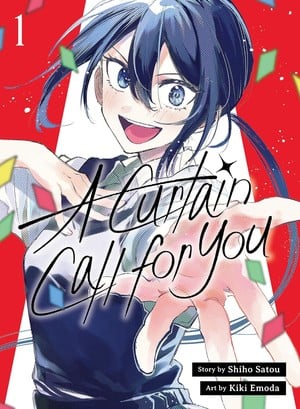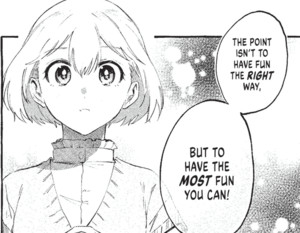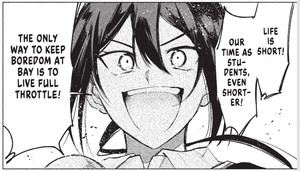The Fall 2025 Manga Guide
A Curtain Call for You
What's It About?

Shy, mousy Sakura Akutsu finds it difficult to breathe in public, much less speak for herself. She makes do by confining her adventures in creativity to the pages of her notebook—until the brash, outgoing new transfer student Tsubame gets her hands on it, that is. The two secretly share the stories Sakura spins, but that secret soon proves too big to keep, and Tsubame whisks Sakura away on an entirely different type of adventure…to start their very own drama club!
A Curtain Call for You has art by Kiki Emoda and story by Shiho Satou. English translation is done by Mei Amaki and lettering by Madeleine Jose. Published by Vertical Comics (November 25, 2025).
Is It Worth Reading?
Caitlin Moore
Rating:

Is this series about a drama club, or is it a melodrama club? See what I did there? Eyyyyyy!!
Everything about A Curtain Call for You just feels… big. Big personalities, big feelings, big reactions. I suppose in a series about a high school drama club, that's to be expected. After all, teenagers are stereotyped as having disproportionately powerful emotions. Actors tend to be seen as having larger-than-life personalities that inform their desire to perform. Coming from a theater family myself, these cliches do have some basis in reality, but it's all just a little too much.
That's probably intentional to a degree! After all, the main thrust of this first volume is that most of Tsubame Hiragi's schoolmates see her as cringe thanks to her tendency to make huge pronouncements. That eccentricity is partially a front she's put on to make herself stand out from the crowd, to be exceptional even as others her age value conformity. It deliberately contrasts her with Sakura Akutsu, the club's writer, who throws herself into the current of public sentiment. Sakura's nervousness and inability to express herself verbally conceal her skills as a writer; on the page, she can channel her turbulent teenage emotions into something beautiful and creative.
Still, everyone's reactions just feel so exaggerated compared to what's called for. When Tsubame starts to read some of Sakura's reading out loud, bringing back a memory of being teased, Sakura screams in horror. As much as I can relate to how horrible that feels, that awful, vulnerable sensation of emotional nakedness, screaming like that feels so extreme. These kids are completely incapable of expressing their feelings without turning the volume up to max. Likewise, Tsubame is always shouting like she's auditioning for the world's loudest version of The Dead Poets' Society. If she's not, she's probably been thrown into a deep depression over something that in most people would cause mild anxiety. Even if it's partially a front, it effectively makes her exhausting.
The writing does have some neat flourishes, in part thanks to Mei Amaki's translation. Sakura's internal narration at the start is laden with the exact kind of metaphors a nascent teenage writer would come up with. Tsubame's declaration that she will “carpe every diem” is a fun turn of phrase that suits her personality perfectly. The art contributes to that sense of “big”-ness, full of motion lines and sparkles and full-page illustrations. It didn't quite work for me, but if it's what you're looking for, it accomplishes its purpose well.
If you only have time for one yuri manga about teenagers honing their stagecraft, I recommend Kageki Shojo. If you need something less measured with more drama, or one that incorporates the perspective of a writer, you could do a lot worse than A Curtain Call for You.
Erica Friedman
Rating:

Holy crow, yes, this manga is worth reading. I don't think I took a whole breath while I read this volume. From Tsubame's first appearance, flying through the classroom, free and unfettered, to the climactic moment when the Drama Club revealed itself, this was truly, quite literally, breathtaking.
When we met Sakura the first time, I was…well, worried isn't the right word, but expecting maybe, a tale of communication dysfunction and possibly bullying, which had me considerably keyed up. I do not enjoy stories of people who are not listened to, for whatever reason. Almost immediately, we are reassured that this is not that kind of a story. So, when Tsubame flies in and launches the plot, with her slightly out-of-date sentences and effervescent personality, not dragging Sakura along, but offering her a hand to come along and see the world, I was absolutely captivated. Props to translator Mei Amaki for keeping Tsubame's diction just slightly too formal or overblown to read as normal for a high school student.
Once again, I tensed when we were introduced to Sango, who, in so many stories, would have been a nasty rival or bullying senpai. She turns out to actually be the professional she is said to be. When she jumped into the drama club's first production with full-throated commitment, I was fully sold on this narrative.
Despite not being an action story, this volume goes full-steam from personal drama in high school to experimental theater in a couple of decisive hops and skips. I'm a sucker for a good play scene, but damn, this one even beats the way-too-on-the-nose play from Bloom Into You for being a solid banger.
Whatever drama Sakura, Tsubame, and Sango are about to face, it'll be the drama they create together that'll keep me coming back for more.
The views and opinions expressed in this article are solely those of the author(s) and do not necessarily represent the views of Anime News Network, its employees, owners, or sponsors.
discuss this in the forum (22 posts) |
back to The Fall 2025 Manga Guide
Seasonal homepage / archives